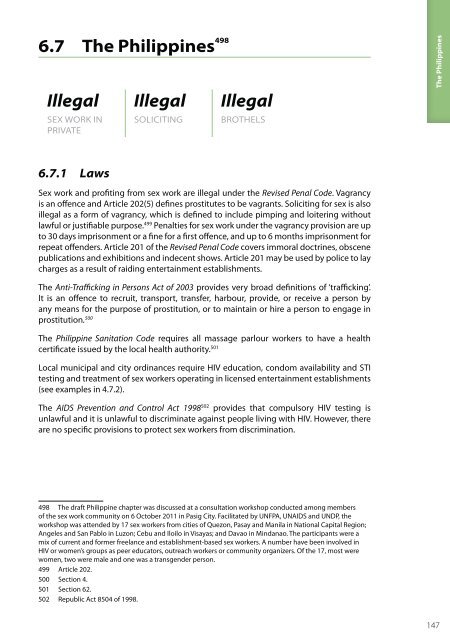SEX WORK AND THE LAW - HIV/AIDS Data Hub
SEX WORK AND THE LAW - HIV/AIDS Data Hub
SEX WORK AND THE LAW - HIV/AIDS Data Hub
Create successful ePaper yourself
Turn your PDF publications into a flip-book with our unique Google optimized e-Paper software.
6.7 The Philippines 498<br />
Illegal<br />
<strong>SEX</strong> <strong>WORK</strong> IN<br />
PRIVATE<br />
Illegal<br />
SOLICITING<br />
Illegal<br />
BRO<strong>THE</strong>LS<br />
The Philippines<br />
6.7.1 Laws<br />
Sex work and profiting from sex work are illegal under the Revised Penal Code. Vagrancy<br />
is an offence and Article 202(5) defines prostitutes to be vagrants. Soliciting for sex is also<br />
illegal as a form of vagrancy, which is defined to include pimping and loitering without<br />
lawful or justifiable purpose. 499 Penalties for sex work under the vagrancy provision are up<br />
to 30 days imprisonment or a fine for a first offence, and up to 6 months imprisonment for<br />
repeat offenders. Article 201 of the Revised Penal Code covers immoral doctrines, obscene<br />
publications and exhibitions and indecent shows. Article 201 may be used by police to lay<br />
charges as a result of raiding entertainment establishments.<br />
The Anti-Trafficking in Persons Act of 2003 provides very broad definitions of ‘trafficking’.<br />
It is an offence to recruit, transport, transfer, harbour, provide, or receive a person by<br />
any means for the purpose of prostitution, or to maintain or hire a person to engage in<br />
prostitution. 500<br />
The Philippine Sanitation Code requires all massage parlour workers to have a health<br />
certificate issued by the local health authority. 501<br />
Local municipal and city ordinances require <strong>HIV</strong> education, condom availability and STI<br />
testing and treatment of sex workers operating in licensed entertainment establishments<br />
(see examples in 4.7.2).<br />
The <strong>AIDS</strong> Prevention and Control Act 1998 502 provides that compulsory <strong>HIV</strong> testing is<br />
unlawful and it is unlawful to discriminate against people living with <strong>HIV</strong>. However, there<br />
are no specific provisions to protect sex workers from discrimination.<br />
498 The draft Philippine chapter was discussed at a consultation workshop conducted among members<br />
of the sex work community on 6 October 2011 in Pasig City. Facilitated by UNFPA, UN<strong>AIDS</strong> and UNDP, the<br />
workshop was attended by 17 sex workers from cities of Quezon, Pasay and Manila in National Capital Region;<br />
Angeles and San Pablo in Luzon; Cebu and Iloilo in Visayas; and Davao in Mindanao. The participants were a<br />
mix of current and former freelance and establishment-based sex workers. A number have been involved in<br />
<strong>HIV</strong> or women’s groups as peer educators, outreach workers or community organizers. Of the 17, most were<br />
women, two were male and one was a transgender person.<br />
499 Article 202.<br />
500 Section 4.<br />
501 Section 62.<br />
502 Republic Act 8504 of 1998.<br />
147
















